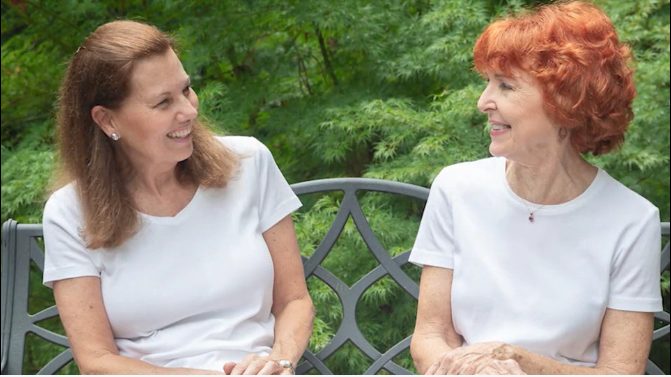
Section Branding
Header Content
Decades of caregiving for people with dementia leads friends to share tips on new podcast
Primary Content
LISTEN: When people take up the task of providing long term care for their loved ones, that job can become the center of their life. But when the focus of the care dies, the caregivers can be left wondering what to do next with their own lives. A podcast by two women who faced that same question is aimed at offering some answers. As GPB’s Ellen Eldridge reports.

Nancy Treaster knew her husband’s early onset dementia diagnosis meant he would die in roughly a decade.
She had years to prepare for his death. She thought she was ready to lose him as he lay dying for more than a week.
Still, when the day came, she was in shock and disbelief after the death of her husband of 34 years.
"The day he died, I was completely blown away as if I had no idea this was gonna happen," she said.
Months before, Treaster realized that she would need something else—something for just herself.
"When my husband passed away," she said "it took a couple of weeks, but after a couple weeks, I was getting up early in the morning energized about how I could give back and leverage with The Caregiver’s Journey.
The Caregiver’s Journey is the podcast Treaster produces with her friend, Sue Ryan. They created it to help others who are caring for people with dementia.
They have produced more than 35 episodes with tips like when to call hospice, how to manage grief and how to make space for yourself.
"It's tempting as a caregiver to let go of everything that's important to you and focus specifically and exclusively on being a caregiver," Treaster said. "And what that leaves you with, when your loved one passes away, is complete emptiness, which opens the door to being stuck in grief."
Treaster compared nearing the end of caregiving to nearing retirement. In both cases, you need to have some other reason to get up in the morning when the work is over, she said.
Ryan, her podcast cohost, said being intentional about transitioning from caregiving to grieving helps move survivors through the process.
"You learn how to be a caregiver," Ryan said. "You don't know how to learn how to be person who was a caregiver and all of a sudden you're no longer a caregiver, you're just, okay, here's life."
“The Caregiver’s Journey” now has 16,000 followers, and there are a lot of podcasts by people who have been caregivers offering help to people just starting out.
More than 188,000 Georgians are currently living with dementia, and the population is aging rapidly.
Katie Tardiff is senior vice president, clinical programs and services at Careforth, a caregiver support company that began serving Georgia family caregivers in 2019.
Tardiff, who has experience as a gerontological nurse practitioner, said that support continues after their caregiving responsibilities end.
"We do continue to offer support for the caregiver following the passing of their loved one for 30 days," Tardiff said. "Caregivers have access to their care team and our resources to help them navigate the early days of grief and transition."
After that month, people are left to support themselves.
That’s why Nancy Treaster and Sue Ryan are pulling their knowledge into what they call a caregivers’ roadmap.
Sometimes, they get questions from listeners about things they haven’t lived through.
"Sometimes, it's a topic where we're doing another project and we realize we don't have the answer," Treaster said. "And, if we don't have the answer, we need to find the answer and we need to share it with other people."
Because now, that’s what keeps them going.

